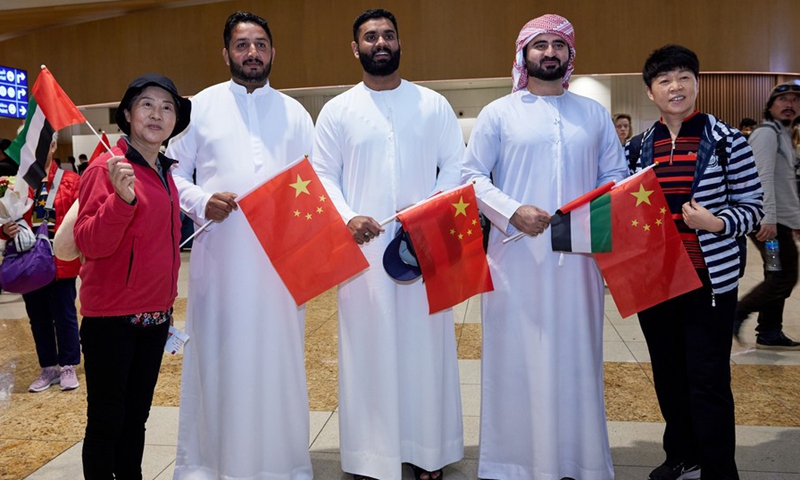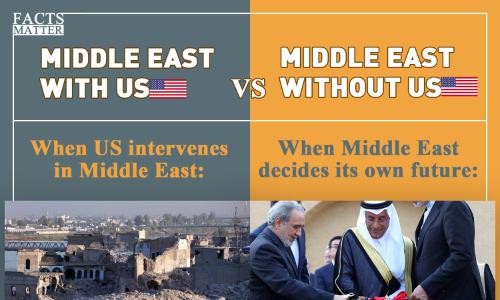China's popularity among Arab youths rises as Middle East enters post-US era, signifying increasing strategic autonomy in regional affairs: experts

Chinese tourists pose for photos with staff at Dubai International Airport in Dubai, the United Arab Emirates, Feb. 6, 2023.(Photo: Xinhua)
From the top to the grassroots, the Middle East has gradually entered a post-US era, which not only signifies the increasing strategic autonomy of regional countries in political and security affairs, but also indicates the rapid evolution of the regional order, and that a new landscape is gradually taking shape, experts noted as China has reportedly surpassed the US in popularity among Arab youths in this year's Arab Youth Survey.
The promising prospects and opportunities presented by China's development, as well as the continuity and stability demonstrated in its domestic and foreign policies, have further strengthened the strategic choice of regional countries in the Middle East to look toward the East. This is particularly attractive among the younger generations, analysts remarked.
China ranked second among all nations considered as friendly, compared with the US, which ranked seventh in the Arab Youth Survey conducted by Dubai-based public relations firm ASDA'A BCW, CNN reported. More than 80 percent of respondents consider China to be an ally of their country, according to the report.
This year's survey, its 15th edition, included face-to-face interviews with nearly 3,600 residents aged 18 to 24 across 53 cities in 18 Arab countries.
In response to the survey showing an increasing favorability toward China among younger generations in Arab countries, Mao Ning, a spokesperson for the Chinese Foreign Ministry spokesperson, said that Chinastand ready to work with Arab countries to continue enhancing youth exchange and cement the public foundation for building a China-Arab community with a shared future in the new era.
The trust that the people in the Middle East, especially young people, in China is largely based on the tangible benefits and opportunities brought about by cooperation with China in the region, Liu Zhongmin, a professor at the Middle East Studies Institute of Shanghai International Studies University, told the Global Times on Tuesday.
Earlier, the 10th Arab-China Business Conference was held in Riyadh, capital of Saudi Arabia, with more than 3,500 Chinese and Arab official and business representatives gathered at the major business conference, in which dozens of deals worth billions of dollars were inked.
"In terms of areas of cooperation covered, this is all-round cooperation," Liu said, noting that in addition to traditional cooperation in energy, the two sides are also expanding cooperation in more areas such as technology.
The deals include a $5.6 billion agreement between Saudi Arabia's Investment Ministry and Chinese carmaker Human Horizons for a joint venture and a $266 million deal signed by Saudi Arabia with Hong Kong-based Android developer Hibobi Technology for tourism and other apps, media reports showed.
While both China and Arab countries are seeking to further boost win-win cooperation, the US is reportedly concerned about the deepening cooperation between Riyadh and Beijing in security and sensitive high-tech sectors.
Just days before the Arab-China Business Conference, US Secretary of State Antony Blinken visited Saudi Arabia. He said that Washington was not asking anyone to choose between the US and China, but said the US "remains the number one partner of choice" for most countries in the Persian Gulf region.
Liu stated that while US officials mostly avoid directly mentioning China, they are actually working to distance China from Arab countries. "Saudi Arabia's response implies a rejection of Blinken's statement, which may also reflect the attitude of most countries in the region," he said.
Behind the US' zero-sum attempt is also its strategic shift away from the Middle East to major power competition with Russia and China, while trying to cling onto its long-term presence in the Middle East. "The US probably did not expect such a huge change in the Middle East this year, and it also has an unexpected and bewildered feeling about its own decline and the rise of other countries," the expert noted.
Saudi Arabia and Iran announced the resumption of diplomatic ties with immediate effect in Beijing on April 6 after the first formal meeting between the two countries' top diplomats in more than seven years.
Analysts noted that China's successful mediation between the two countries not only shows that that the diplomatic philosophy advocated and practiced by China is being recognized worldwide, but also has significant amplification and spillover effects.
Israeli Prime Minister Benjamin Netanyahu is set to visit China next month, according to reports from the Times of Israel, quoting a source as saying that advanced contacts have been held in recent days between the two leaders' offices to arrange the visit.
Although neither country has officially confirmed the news yet, reports suggest that Netanyahu will attempt to advance relations with Saudi Arabia with the help of China. However, this move may provoke discontent from Washington, which has been consistently urging normalization of relations between the two countries.
The report quoted senior sources as describing Netanyahu's upcoming trip to China as "breaking the frame," as the US has long held an important position in the Middle East, and Israel is one of the most important allies of the US in the region.
Israel's response can be seen as a continuation of Saudi Arabia and Iran's announcement of the resumption of diplomatic ties in Beijing. This further indicates that the US is finding it increasingly difficult to exert the same level of dominance in the Middle East as it did in the past. More and more allies and partners of the US in the region are starting to make decisions based on their own national interests, said Tang Zhichao, a Middle East analyst at the Chinese Academy of Social Sciences.
In the foreseeable future, the US' regional influence will continue to decline with the anticipation of a significant decrease in its willingness to engage in diplomatic efforts, intervene in conflicts, and reshape the order in the Middle East. Meanwhile, countries in the region will further explore paths of modernization that align with their national circumstances while balancing globalization and localization, analysts noted.



